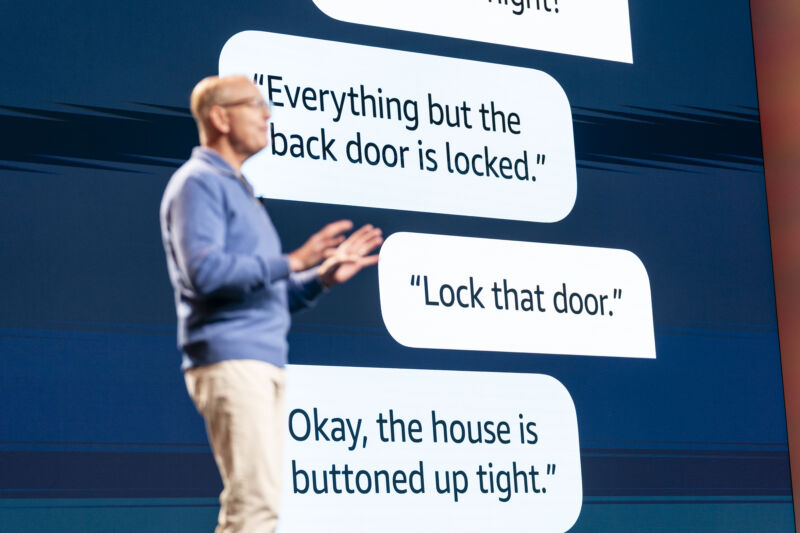
Amazon thinks that in the near future, its Alexa voice assistant will offer enough value that customers will be willing to pay a subscription fee to use it.
After Amazon’s devices event last week, when the company showcased generative AI features it’s developing for Alexa, Bloomberg asked Dave Limp, SVP of devices and services at Amazon, if there will be a time when Alexa’s AI features will require a subscription.
“Yes, we absolutely think that,” the executive responded.
During last week’s event, Amazon demoed generative AI features it has been working on for Alexa and that it will let Echo users preview in the coming months. These features included the ability to have a back-and-forth discussion with Alexa showcasing its own “opinions,” like a favorite sports team. Previewing those features won’t cost anything besides the cost of the Echo hardware and, perhaps, some of your sense of privacy.
But in his talk with Bloomberg, Limp emphasized the costs associated with turning Alexa from a voice assistant that can tell you the temperature to a generative AI chatbot that can draft an email, based on information previously discussed with it, for you to send to your friends. Limp said “the cost for inference of the model in the cloud, is substantial.” On Monday, Amazon announced an up to $4 billion investment and minority ownership in Anthropic to build out large language models.
Limp wouldn’t put a timeline on when Amazon will charge for Alexa access but said “it’s not decades away.” He added that Alexa would have to be “remarkable” before that happens.
“We don’t have an idea of a price yet,” Limp said. “We’ll talk to customers and learn from them, what they believe the value is. The Alexa that you know and love today is going to remain free.”
Don’t bet on Alexa’s subscription fee being baked into your Amazon Prime subscription or hardware purchase, either, as Amazon thinks both represent “unbelievably oversized value already,” Limp said.
Limp is leaving Amazon at the end of the year and becoming Blue Origin’s CEO. However, an Amazon spokesperson echoed Limp’s sentiments in a statement to The Register. Limp wasn’t only speaking of his own opinion, but rather, company goals.
After all, ChatGPT (which is, of course, miles ahead of Alexa when it comes to generative AI capabilities) has a paywalled version, ChatGPT Plus. It seems Amazon is planning on Alexa offering a comparative amount of value one day soon.
As Amazon looks for ways to drive revenue from Alexa, Alexa’s potential generative AI features are still in their very early stages, executives made clear at last week’s presentation. Alexa, like other voice assistants, has been experiencing uncertainty lately. In January, Business Insider reported Alexa was on track to lose Amazon $10 billion in 2022. The division suffered layoffs and, as mentioned, is now anticipating the departure of its longtime leader this year.
While Amazon continues developing its supposedly subscription-worthy Alexa, the devices division appears to be trying to squeeze money out of customers wherever it can.
In addition to announcing new hardware last week, The Verge this week reported that Amazon is discontinuing Alexa Guard, which included free home security features, like smoke, carbon monoxide, and glass break sound detection. To get those aforementioned features, users will now have to sign up for the new Alexa Emergency Assist, which costs $5.99 a month or $59 a year until January 8. Amazon hasn’t decided how much it will jack up the price after that date. Some of Alexa’s Guard features, like the ability to arm and disarm Ring alarms and turn on the lights when you’re away, are being folded into the standard free Alexa service, though.
Further, Amazon will start showing ads on Prime Video next year unless users pay an extra $2.99 per month. Also, earlier this year, Amazon hamstrung Remapper, which let users reprogram Fire TV remotes for free. The move was likely made in consideration of Amazon selling its programmable remote.
Amazon is still years from having the sort of Alexa worth charging a subscription fee for, but the company’s statements indicate how voice assistants might continue to survive moving forward after a decade of failing to be lucrative. In Alexa’s case, Amazon is hoping customers can be convinced to hand over dollars every month to help Alexa make ends meet.
https://arstechnica.com/?p=1971157

